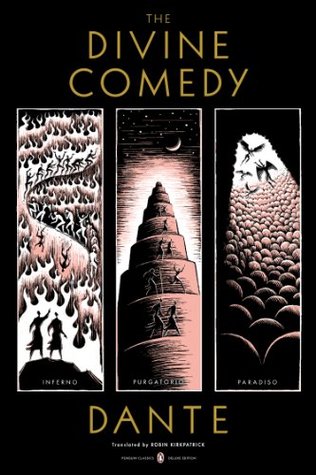More on this book
Community
Kindle Notes & Highlights
The Commedia
Inferno, Purgatorio, Paradiso
Where did the mass of earthly matter that Satan had displaced disappear to? His answer is that, since Satan struck the earth at the point which was later to be named Jerusalem, the core of matter that he gouged out was extruded into the southern hemisphere, at the antipodes of Jerusalem, to form a mountain-island – on the summit of which is the Garden of Eden.
This mountain is now Mount Purgatory, where penitents will spend centuries on its slopes, recovering by their own willing efforts the happiness that was lost to humanity by the fall of Adam and Eve. Free as this flight of rigorous fancy undoubtedly is, it serves to embody some of Dante’s most characteristic emphases, in the philosophical as well as the poetic sphere.
Doubt, for Dante, is a productive state of mind. This is true even in the Paradiso, where, if one were to suppose that Christian faith was simply a matter of comforting certitude, one might imagine that Dante would have been content to offer, faithfully, a simple reaffirmation of established doctrine. Yet at 4: 124–32, the poet declares that doubt springs like a growing shoot from the base of truth and drives the mind onwards to ever greater understanding.
Dante’s Sources
Statius (d. c. AD 96) wrote his epic poem Thebaid to depict, in spectacular fashion, the corruption and divisions that arose in Thebes after the death of Oedipus.
Human Being: Philosophy and Theology in the Commedia
Indeed, initially sin is diagnosed from a rational point of view, unaided or unimpeded by specifically Christian categories of thought. One might even say that sin in the Inferno is seen less as an offence against God than as a crime against humanity, in which the clarity of rational perception is fatally clouded or perverted.
It follows from this that the worst of sins, according to the plan of Hell, is not lust or greed or even avarice but rather treachery, which is punished at the very centre of Hell. Traitors – whether to family, friends or nation – undermine the best institutions that human beings have rationally established. They are now imprisoned in ice; and this punishment is an exact indication of how, in Dante’s view, treachery wholly extinguishes the fruitful capacity for love that exists in all individuals.
Dante and Beatrice
* * *
Reading the Commedia
* * *
* * *
The Future of Dante’s Commedia
exactitude of observation and phrase is the precondition of all communication between human beings.
In The Cantos (1917–69), Pound attempts to weld an alliance between Chinese thinking and medieval thought (drawing on Cavalcanti as well as upon Dante), which could conceivably re-animate the language of the lost tribes of Europe.
Heaney – particularly in his collection from 1991, Seeing Things – repeatedly turns to Dante (as Joyce did also) in his attempt to record those epiphanies, or moments of revelation, that can arise from the sudden perception of value in, for instance, a dust-veined beam of light.
The only remote analogy for Dante’s highly original conception of Purgatory, as an island located in the southern hemisphere, is Station Island in Lough Derg, County Donegal – still a site of penitential practice. Heaney recognized this in his 1984 collection entitled Station Island.
This becomes Eliot’s Christian theme in Four Quartets (1943): ‘We shall not cease from exploration / And the end of all our exploring / Will be to arrive where we started / And know the place for the first time.’
Dante’s Language and the Question of Translation
* * *
* * *
We all so willingly record our gains, until the hour that leads us into loss. Then every single thought is tears and sadness.


